Who’d work in HR?
The good news, is that actually, it’s plenty still.
Last year five of the fastest growing roles in America since 2018 were specifically in HR. HR manager positions came the highest (in second place), followed closely by the likes of diversity and inclusion managers (third); employee experience managers (fifth) and chief people officer (15th) and head of rewards (21st) respectively.
Given the way the world of work has changed so dramatically in recent years, this is arguably no surprise.
It was HR that got both employers and employees through the pandemic. This was their time – and many stepped up to the plate.
But despite improving respect for HR amongst the C-suite (in 2024 a VP of talent acquisition can now expect to earn between $283,000-$498,000 according to AIHR), there’s one thing that remains stubbornly persistent: the employee view of HR.
The simple fact is, despite being more prominent in organizations, employee-HR relations are as low as they ever have been.
Staff don’t trust HR
Fundamentally, the stereotypical employee view of HR remains – that it is simply all about ‘hiring and firing,’ – with not much more in between.
Recent polls suggest 34% of staff simply don’t trust HR (according to a 2023 study by ARRIS Composites), while a recent Harvard Business Review article found 37% of employees thought HR was more interested in advocating for their company than they were for them.
But it’s the very latest research around this topic that paints an even dour picture.
Revealed in a provocatively entitled new paper ‘It’s all HR’s Fault’ – by HR systems provider, Cezanne – is a litany of frustration and despondency with HR.
HR, it concludes, carries a massive image problem still, but not much is being done to do anything about it.
What’s wrong with HR? An overview
In compiling its research, Cezanne asked the HR Ninjas community (a group with more than 30,000 members), what they felt were the perceptions of their profession.
What came back – from the responses of more than 1,000 responses – was the belief that HR professionals still work in a realm that few employees either understand or trust, or that they simply dislike.
HR is perceived as doing the boardroom’s dirty work – being the ‘reactionary enforcers’, or (worse-still), the bureaucrats that sit at the right-hand side of the executives.
What’s wrong with HR? The details:
According to the research, a staggering 83% of the HR professionals polled said they thought employees had a negative perception of HR.
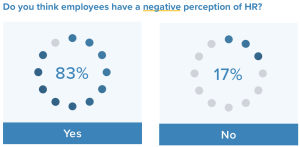
When asked to explain why this might be, the results confirmed what many may might suspect – that HR only ever seems to interact with staff when something’s ‘gone wrong’.
The data found that this was by far the top reason HR think employees have a negative perception of HR (45%) – more than double the next most popular reason – bureaucracy and red tape (17%) and staff not understanding what they do (15%).
Notable was that HR professionals themselves thought staff see them as being in cahoots with management (7%), while many HR pros think staff harbor the memory of a poor previous interaction with an HR professional (4%).
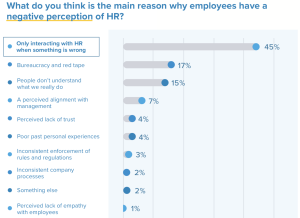
This perception isn’t helping HR folk either
Not only do these findings reveal a sad state of affairs in terms of employees’ perceptions of HR, this negativity is having a wearing effect on HR people too.
Nearly one in five say the worst thing about working in HR is the distrust and lack of respect employees (and managers for that matter) show them – which is second only to having disjointed processes – a factor that probably also plays a part in contributing to employee ennui.
The research finds one in ten find their duties repetitive and unrewarding, and many (7%) also feel they have to deal with managers who simply refuse to learn. (See chart below).
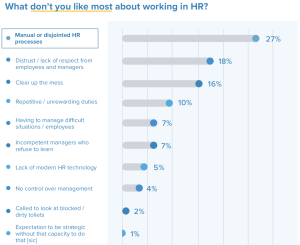
Perhaps, unsurprisingly given all of this, a significant 32% of HR professionals polled said they had considered quitting the HR profession entirely.
It’s a minority that say they never considered quitting the profession.
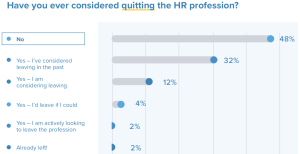
Perception is reality
It’s not just employees that lack respect HR though. Those polled still felt the boardroom (despite improvements), wasn’t taking them seriously enough.
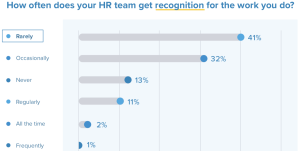
According to the research, barely two-in-five HR professionals say they rarely get any sort of recognition for the work they do. A further 32% only get recognition occasionally and 13% ‘never’ get any.
When working under these circumstances – with HR professionals seemingly getting little respect from both the business and employees – it’s easy to see why those working in the profession can feel so downcast, and why the negative perception of them can become their day-to-day reality.
Says Lizzie Henderson, founder of the HR Ninjas community: “HR spends much of their time doing ‘what’s important’, but unfortunately, it isn’t often ‘what’s visible’.”
She says: “One can easily see why they[HR] spend a lot of time on important work that often goes un-noticed by the business.”
What can HR do to turn the tide?
But could HR professionals be contributing to their poor reputation?
Henderson says: “The perception is that HR only gets involved with things go wrong is created as a result of HR not being brought into situations early enough. With disciplinaries, for example, HR advice tends to be sought to deal with the consequences of an event happening, rather than us preventing the event from happening in the first place.”
She continues: “It’s no wonder HR gets accused of being reactive. The problem is, perception is reality. HR has to get out of the weeds, in order to do the proactive value-creating work that we love.”
What do do?
It maybe won’t surprise many to read that the advice from the research is for HR professionals is to get more strategic, and, not only this, get the ear of those who matter most – the C-suite.
Henderson says: “If you ask HR professionals, they would say that they would much rather be empowered to take a proactive approach, so that they can deal with the actual underlying problems and not a reactive approach that just deals with the symptoms of the problems.”
She adds: “Too often we see job titles being created like ‘head of HR’ or ‘HR & office manager,’ and HR needs to be pushing back on these practices.”
She continues: “HR is not a general administrative role, and we [as HR professionals] should not be picking up all of those responsibilities that nobody wants.”
She says: “If we want the function to be viewed as strategic by the C-suite, we need to be better at putting measures in place for the critical work HR does.”
Fairness will win employees hearts
But meeting the expectations of one group – the C-suite – is different to what HR professionals need to do for another – actual employees.
HR is fighting a reputation war on two fronts, and to regain trust of employees, the data suggests a different approach is needed: simply being seen to be ‘fair’.
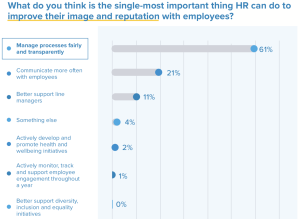
By far the single-most important thing HR professionals believe they can do is to be seen to manage processes fairly and being transparent (61% of respondents said this).
The next largest different was communicating more with employees (21%) – something that arguably feeds into the former too.
Interestingly, none regarded supporting diversity and equality initiatives as something that would improve the reputation of HR.
Here’s just a flavor of what some respondents said:
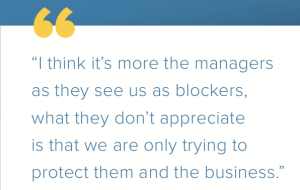

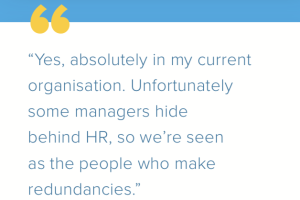

So, is the image and reputation of HR really all ‘HR’s fault’?
No, probably not, but the inference is that HR could certainly do more to help its cause – both in the boardroom and amongst employees it serves.
“It’s important that HR immerses itself fully in the business,” says Henderson. “HR needs to be connected to the purpose and goals of the organization.”
She asks: “Do you [HR folk] know the top-level corporate objectives? Or what really matters in the boardroom? What are the KPIs that the CEO is looking at every day? HR needs to be better at talking the language of business, and in my experience, those that do this get offered more senior positions with greater strategic business influence.”
But, but just don’t forget employees too!
“It’s important to be visible,” she adds.
“So that colleagues see us as individual human beings, not just HR.”
[See see the full report, click here]
